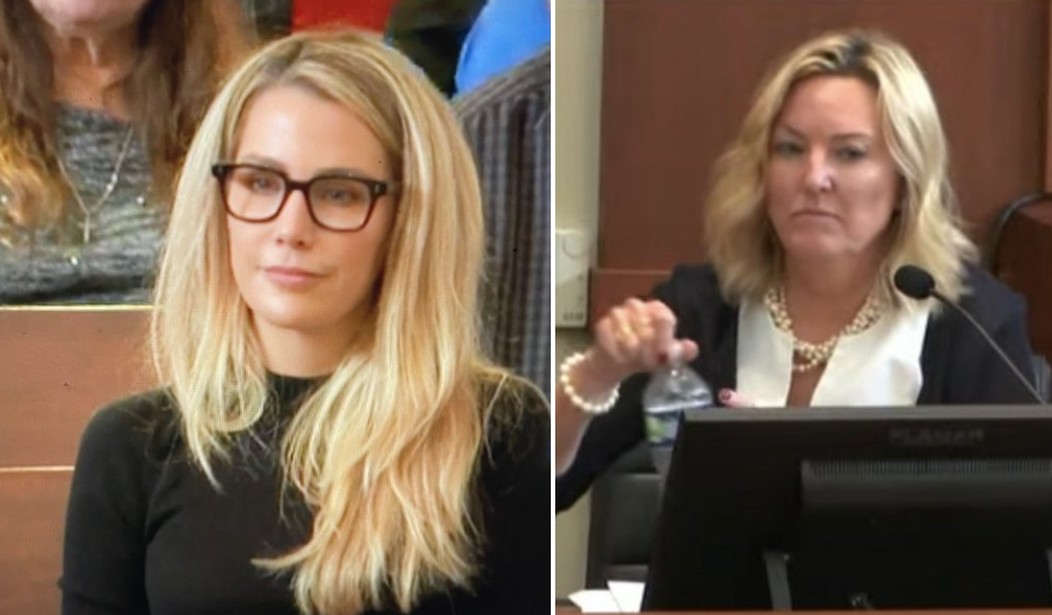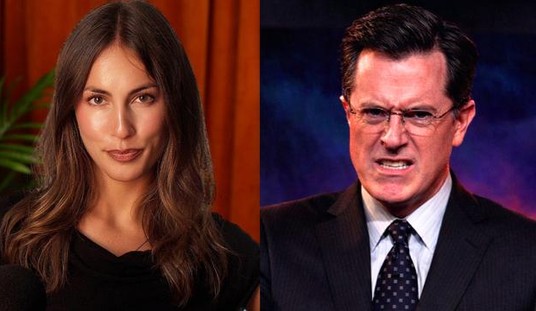Lawyers for Johnny Depp rested their case Tuesday and then fought off a motion to strike and throw out the defamation case against actress and #MeToo activist Amber Heard. The judge denied the motion and allowed the trial to continue. During his argument, Ben Chew pointed at Amber Heard and forcefully said, “Miss Heard physically abused him. She’s the abuser in this courtroom.”
“She is the abuser in this courtroom”
Well said!#JusticeForJohnnyDepp #JohnnyDeppVsAmberHeard #JohnnyDepp #JohnnyDeppAmberHeardTrial pic.twitter.com/WtMfCvozVY— johnny depp vs heard (@johnny_depp_law) May 4, 2022
After the motion was denied the defense was up to bat and called for its first witness, Dr. Dawn Hughes, a highly paid expert—just like Depp’s expert Dr. Shannon Curry—who was hired to evaluate Heard. As is common with hired forensic psychological experts in court cases, they found exactly the opposite results in their evaluations of Heard. Hughes found that Heard has PTSD with no signs of a personality disorder, while Curry found that Heard has borderline personality disorder, histrionic personality disorder, and had “grossly exaggerated” PTSD symptoms.
These polar opposite findings leave the audience wondering: what good are these psychological evaluations anyway, and why are we wasting days of testimony on them if they are so subjective that the same tests can show opposite results? Whether or not all the tests were actually the same is still unclear—which is part of the problem of the highly complex business of psychological testing for court cases.
The only reason why Heard’s psychological health is an issue is that her legal team made it so, claiming that she has PTSD from her ex-husband’s alleged abuse. This opened the door for the plaintiff to demand an evaluation by an expert they hired. That in turn prompts the other side to hire another expert to refute that testimony. Some of these experts can get $30,000 to $100,000 or more (especially in a high-profile case) per forensic report. In other investigations in family courts across the country, forensic psychological evaluators have been found to engage in corrupt practices, including the false diagnosis of mental disorders that have harmed and bankrupted families to such an extent many have filed lawsuits or are currently seeking to file lawsuits against those evaluators.
A growing number of critics believe psychological evaluations should not be a part of civil cases (and possibly not in criminal cases either unless the question is to prove insanity). Concerningly, the industry is a money-maker that invites abuse and fraud when psychological “experts” insert themselves into judicial training where they train judges in their own personal belief systems. Some believe in “parental alienation syndrome,” others believe in “coercive control,” and others stake their reputations on “reunification therapy”–and the list goes on ad infinitum with none of them agreeing with each other. The in-fighting in the psychological community is epic. The warring psychologists with their theories about everything can confuse and confound even the most educated juror or judge. In the meantime, are the participants receiving justice when the “experts” are meddling in their cases and advocating for their own pet causes while bolstering their status as experts and increasing their hourly rate with each court case they attend? An argument can and should be made that justice is not whatever we’ve been witnessing.
I’ve personally found Dr. Curry more credible and likable on the stand than Dr. Hughes, but that doesn’t mean she’s right. None of us would know if we haven’t had training in the tests and instruction on how to read and interpret them. But different psychologists read and interpret these tests differently! Are the tests even accurate? Why are we still talking about this? Where’s my mega-pint?
I Johnny Depp need a MEGA PINT#JohnnyDeppVsAmberHeard #JohnnyDepp #Megapint #JohnnyDepptrial #JohnnyDeppDeservesJustice #JohnnyDeppDeservesMegapint pic.twitter.com/62DfEdhWbn
— myinnermost thoughts (@MyinnermostT) April 25, 2022
At this point, with two experts completely contradicting each other the judge should simply strike both testimonies, declare it a wash, and move on to actual eyewitness reports. Dragging the litigants and the jury through days of examination and cross-examination and redress of two pointy-headed shrinks trying to explain the minutiae of theoretic psychobabble is enough to make anyone want to self-medicate with whatever hard substance is nearby. After all, isn’t happy hour anytime?
Johnny Depp when asked about drinking in the mornings when he was married to his first wife: "Isn't happy hour anytime?" pic.twitter.com/f0T0RZ2cJZ
— Jackson Richman (@jacksonrichman) April 21, 2022
Those of us who are glued to the screen are in absolute agony with these psychological shenannigans. Yes, many people like Dr. Curry— affectionately called “Dr. Muffin” (If you know, you know)—because she’s very beautiful and engaging, but she could totally be a quack just like the other one with the mega-Karen energy seems to be with her dramatic retelling of the gossip Amber told her like she thinks it came from the book of Ecclesiastes.
AH' Lawyer: Why did your husband get the muffins for Amber Heard?
Dr. Curry: He didn't get the muffins for Amber Heard!#JohnnyDepp pic.twitter.com/8qXe7VQO0v— HRH Itziar Ituño (@HRH_ItziarItuno) April 26, 2022
To be fair, Dr. Curry was far more professional and seemed to try to speak in general terms and gave the results of her report without breathless hyperventilating about wild allegations that have no corroborating evidence: i.e. medical reports or witness testimony. Dr. Hughes did all of those things, including speaking as if she had personally seen Depp “rip off [Heard’s] nightgown” and do things to her I don’t want to type. You can hear it below. WARNING: extreme language and inaccurate characterization of testimony. When Dr. Hughes says these allegations were “reported,” she means by Heard to her therapists, none of whom encouraged her to call the police.
Wednesday should see Dr. Hughes subjected to cross-examination by Depp’s counsel, and she will probably not survive it. They didn’t seem very worried about her overly dramatic testimony, which sounded more like a seedy novel than real life.
I'm shaking my head at her too.#JohnnyDeppVsAmberHeard pic.twitter.com/ZsOVAvXzR5
— Kisha (@KishaCG) May 3, 2022
My coverage continues on my YouTube channel, where I’m live streaming the trial and talking with legal experts (okay, one of them is my sister but she is a good lawyer–remember Dogs on Death Row?) and reading your comments. Come by. If you’re going to watch this clown show, don’t do it alone.










